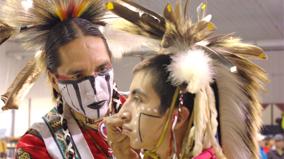Voices Across the Water
There is a moment during the construction of a canoe when its true form is revealed. A hull drops into place. The elegant arc of a bow cuts forth. A similar process sometimes occurs in life, when a person finally discovers their true path. The feature documentary Voices Across the Water follows two master boat builders as they practise their art and find a way back to balance and healing.

Details
There is a moment during the construction of a canoe when its true form is revealed. A hull drops into place. The elegant arc of a bow cuts forth. A similar process sometimes occurs in life, when a person finally discovers their true path.
The feature documentary Voices Across the Water follows two master boat builders as they practise their art and find a way back to balance and healing.
-
directorFritz Mueller
-
writerTeresa Earle
-
producerTeresa EarleShirley VercruysseFritz Mueller
-
director of photographyFritz Mueller
-
editorGraham WithersTeresa Earle
-
composerJordy Walker
-
featuringHalin de RepentignyWayne PriceViolet GatensbyDuncan SpriggsJake ArmstrongJoe MigwansTim AckermanMelvin WilliamsRoberta WallyKeith Wolfe SmarchWhitney HartiganCherri Price
-
production managerTeresa Earle
-
location soundFritz Mueller
-
aerial cinematographyFritz MuellerJassin GodardMike Code
-
archival footageDuncan Spriggs
-
additional cameraBill KendrickBrian Ladue
-
sound editingStackwall Sound
-
sound designStackwall Sound
-
sound editorJordy WalkerKyle Cashen
-
post-production soundStackwall Sound
-
sound mixerJordy Walker
-
additional compositionJesse Zubot
-
colouristFritz Mueller
-
title designJenn Strom
-
graphic designMary Binsted
-
closed captioningLine 21 Media Services Inc.
-
post-production coordinatorTeresa Earle
-
paddlerRichard MalvasioBamby JamesWaughnita James EltonEmily SheakleyHerb Kaaxh Tséen Sheakley JrRose WillardAndrew RobinsonRJ SantosClaus SchytrumpfMichel Vincent
-
support boatTommy TaylorAdam Zenger
-
appearanceMax VincentTed HartJustin SmithJack Smith SrJack Smith JrStuart SchmidtJerry MosureWalter CameronCharlie BurnsHarold GatensbyPhil GatensbyColleen JamesEileen WallyBessie JimDaisy GatensbyRyker JohnsBen GribbenAli KhodaGisela NiedermeyerLeslie HamsonTheo StadBear the dog
-
carvingsWayne Price
-
dugout canoesWayne Price
-
paintingsHalin de Repentigny
-
birchbark canoesHalin de Repentigny
-
legal servicesBoughton LawAustring Fairman and Fekete
-
insuranceFront Row Insurance
-
accountingSherrill Sirrs Inc.
-
bookkeepingTeresa Earle
-
production executiveMike Gravitis
-
line producerJennifer Roworth
-
technical coordinatorWes Machnikowski
-
studio administratorCarla Jones
-
senior production coordinatorNathan ConchieNicolas Ayerbe Barona
-
marketing managerKay Rondonneau
-
publicistKatja De Bock
-
executive producerShirley Vercruysse

















